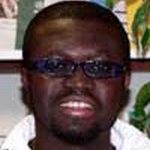We’ve launched a new blog series called ‘Data Matters – data stories from Brunel’ where Brunel researchers are invited to share their data stories about their research and how they manage, share and use open data.
 Dr Nana Anoyke is a Senior Lecturer in Health Economics and is Director of Research for the Department of Clinical Sciences.
Dr Nana Anoyke is a Senior Lecturer in Health Economics and is Director of Research for the Department of Clinical Sciences.
Tell us about your research and the data you work with.
My research covers addressing methodological challenges in understanding why (and how) people make decisions on lifestyle behaviour change, with a view to informing the design of public health interventions and methods for assessing the value for money of such interventions.
I work with large primary (collected as part of clinical trials) and secondary datasets (publicly available international and national datasets).
Is there a culture of data sharing in your field?
Yes, data sharing is practiced in health economics particularly regarding data for populating decision analytic models.
What kinds of data do you make openly available and how/where do you make them available?
The data I make openly available include estimates for populating economic models and dataset used for cost effectiveness analyses. I make them available via data repositories (e.g. figshare) and journals (as supplementary files).
Are there any data challenges associated with your research, in particular around managing, sharing or reusing open data?
The data challenges associated with my research include: (a) anonymised data; (b) working in large teams with the principal data collectors often based outside Brunel; and (c) large datasets with lot of variables.
How have you overcome these challenges?
I have overcome these challenges by developing a data management plan – this helps to identify the data challenges and potential solutions at the outset of projects.
What advice would you give a researcher just starting out about open science/open data?
Open science is the present and the future. It could increase the impact of our research.